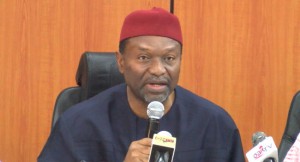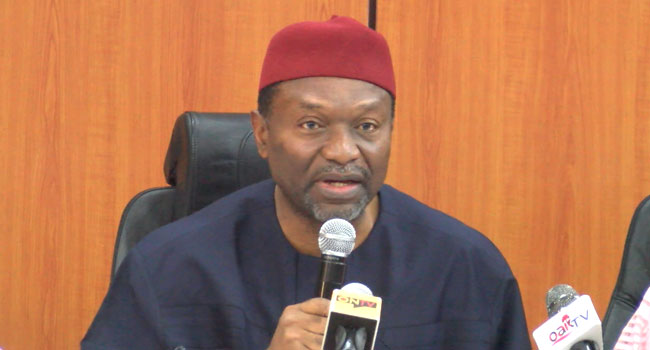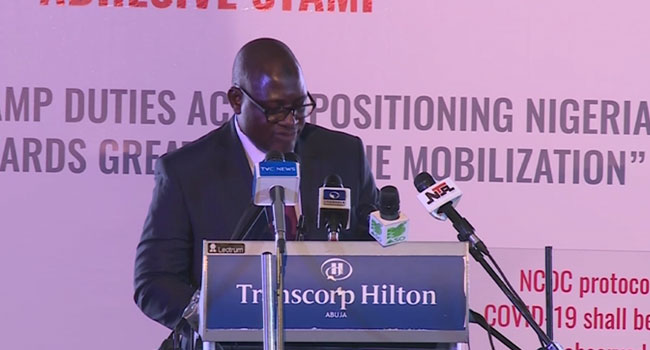
The government, however, said it was working towards increasing its internally generated revenue through the broadening of its tax base.
The Minister of Budget and National Planning, Senator Udo Udoma, made this clarification on Monday, while responding to a comment by Senator Ben Bruce, at the public hearing of the Joint Session of the National Assembly on the 2017 Budget.
The minister said “a view has been expressed that we should not increase taxes, that we should broaden tax collection instead. That is precisely what is in the budget”.
No Increase At All In Taxes
Senator Bruce had given the impression that the Federal Government was about to increase taxes, a development he said would further worsen the economic fortunes of individuals and businesses.
Mr Udoma stated that “there is no increase in Value Added Tax (VAT), there is no increase in company’s income tax (and) there is no increase at all in taxes.
“But people who are not paying taxes must be made to pay. So the idea is to increase revenue by broadening the tax base, not by increasing taxes”.
Some economic experts who spoke at the session advocated government spending its way out of recession, partnering the private sector to speed up growth, planning for sustainable development, working with the State governments for integrated development, involving relevant experts, as well as consulting widely in planning, monitoring and evaluation of projects among others.
The Minister told the gathering, which also include Civil Society Organisations and private sector operators, that all the views expressed by the speakers have been captured in the 2017 Budget.
“The concerns that have been expressed are reflected in the budget; the need to spend our way out of recession is reflected in the budget, the need to spend in a way that will attract private sector spending is also reflected in the budget.
“Indeed, the thrust of the budget is to partner with private and development capital to leverage and catalyse resources for growth,” he said.
Achieving Economic Growth
Mr Udoma said the government realised that public resources cannot be enough to drive the development process, which is why the 2017 Budget was directed at catalysing private sector resources and using PPP for a number of projects.
“If you look at housing, we are putting in 100 billion Naira, but we are expecting another 900 billion Naira from the private sector.
“If you look at the EPZ, we are putting in 50 billion Naira, but we are expecting a huge injection of funds from the private sector.
“So, this budget is aimed at achieving economic growth, aimed at achieving diversification, aimed at improving our competitiveness, aimed at improving ease of doing business, aimed at creating more jobs and social inclusion, and aimed at improving governance and security,” he explained.
According to the minister, the spending is targeted at areas that have quick transformative potentials such as infrastructure and agriculture, manufacturing, solid minerals and services among others.
He pointed out that the present government believes in planning, stressing that “when we came in, we came out with a document – the Strategic Implementation Plan for the 2016 Budget of Change.
“We set out short term plans for one year. We started working on a longer term plan for four years 2017 -2020; and that involved extensive consultation”.
Economic Recovery and Growth Plan
Senator Udoma, who touched on partnership with state governments, told the audience that the Federal Government has consulted severally with State governors and with Commissioners of Planning in all the states.
“We are working closely with the States. We even organised a retreat in February 2016 with all the states. In all our initiatives, we are working with the states.
“(Also) on agriculture, we are working with the states; we even have task forces that involve state governors. So, we are working together with the states,” he said in a statement issued by his spokesman, Akpandem James.
The minister spoke further on the Economic Recovery and Growth Plan where he pointed out that the government consulted the private sector extensively.
“Indeed, just last week we met twice with captains of industry and members of the private sector to sit down and expose the plan to them and get their input.
“We are going to council soon and subsequently the plan will be launched before the end of the month,” he said.
Mr Udoma further explained that because government has bold plans which are tailored towards pulling Nigeria out of recession, investors are changing their attitude towards Nigeria.
“People have heard of our plans; they have seen the plan because we have had extensive consultations with our development partners – with the World Bank, with IMF (and) with UNDP.
“They have all been exposed to our plan and we have shown them what we are determined to do (because) that is why people are believing in Nigeria and investing in the Eurobond,” he disclosed.
The Path Of Growth
The minister was emphatic that the government has a clear vision and is on a determined path to get the economy out of recession.
“We are determined thereafter to begin to go back to the path of growth, a more diversified growth, not depending just on crude oil.
“We want to stimulate our manufacturing sector, we want to stimulate agriculture; so we have a coherent, cohesive plan,” he said.
The Minister of State, Mrs Zainab Ahmed, on her part, said government was determined to ensure that Nigerians experience inclusive growth this time around, “which is why we have the social intervention programme.
“The social intervention programme took off fully in October 2016 and all the four components of the SIP have now been rolled out in their first phases and we are scaling up on a monthly basis.” she said.
Mrs Ahmed added that the programme would benefit greatly from the support of the National Assembly, in order to ensure that the benefits were distributed equitably and that no needy citizens were missed out.




